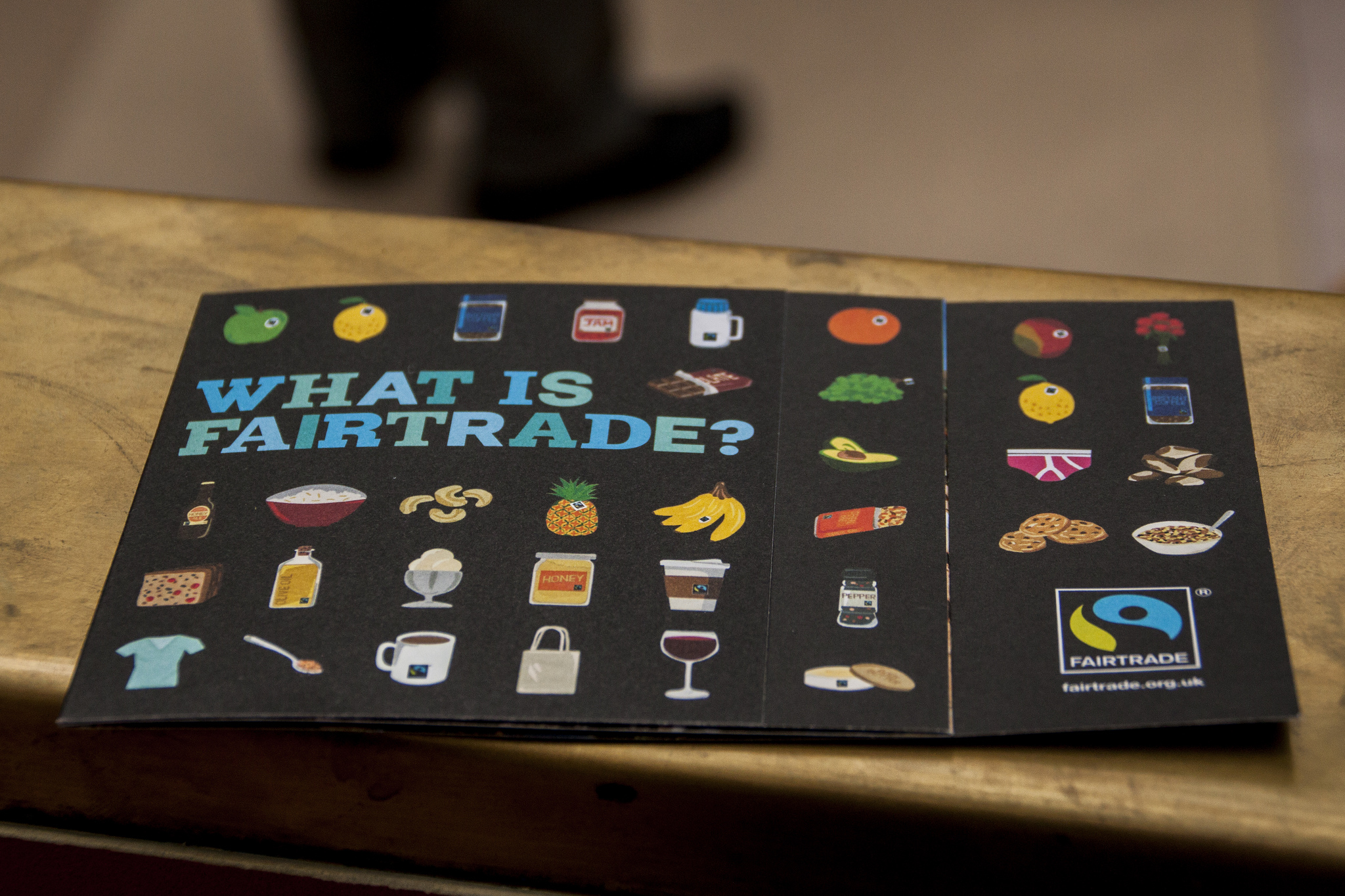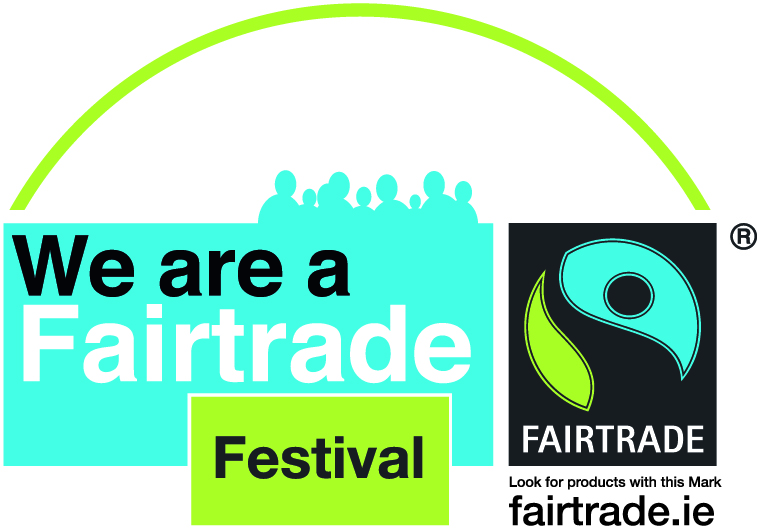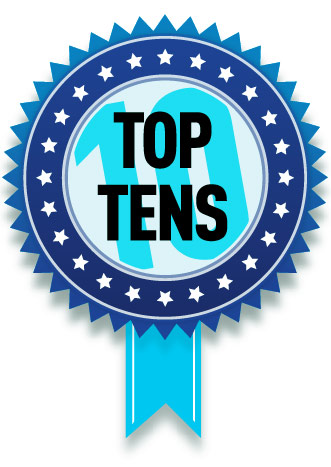
Anyone who buys, sells or stocks goods that have achieved Fairtrade
certification are not engaging in a ‘simple’ or ‘neutral’ act. Quite to the contrary, it is ENTIRELY political.
Fairtrade Ireland, founded as the Irish Fair Trade Network (IFTN), in responding to a government consultation on Ireland’s overseas aid policy in 2012 stated:
“The Fairtrade label was invented as a way to enable citizens as consumers to do something about production and processing conditions in the developing world and unfair pricing. By providing an independent assurance that these products meet decent standards which cover the cost of production and enable producers to earn a good living, they enable consumers to make a positive contribution as part of normal shopping activity.”
Here, we take stock of 10 facts from Ireland’s contribution to the global Fairtrade movement.
1. Clonakilty became Ireland’s first Fairtrade town in 2003. Jump 12 years later and there are now 51 recognised Fairtrade towns and cities.
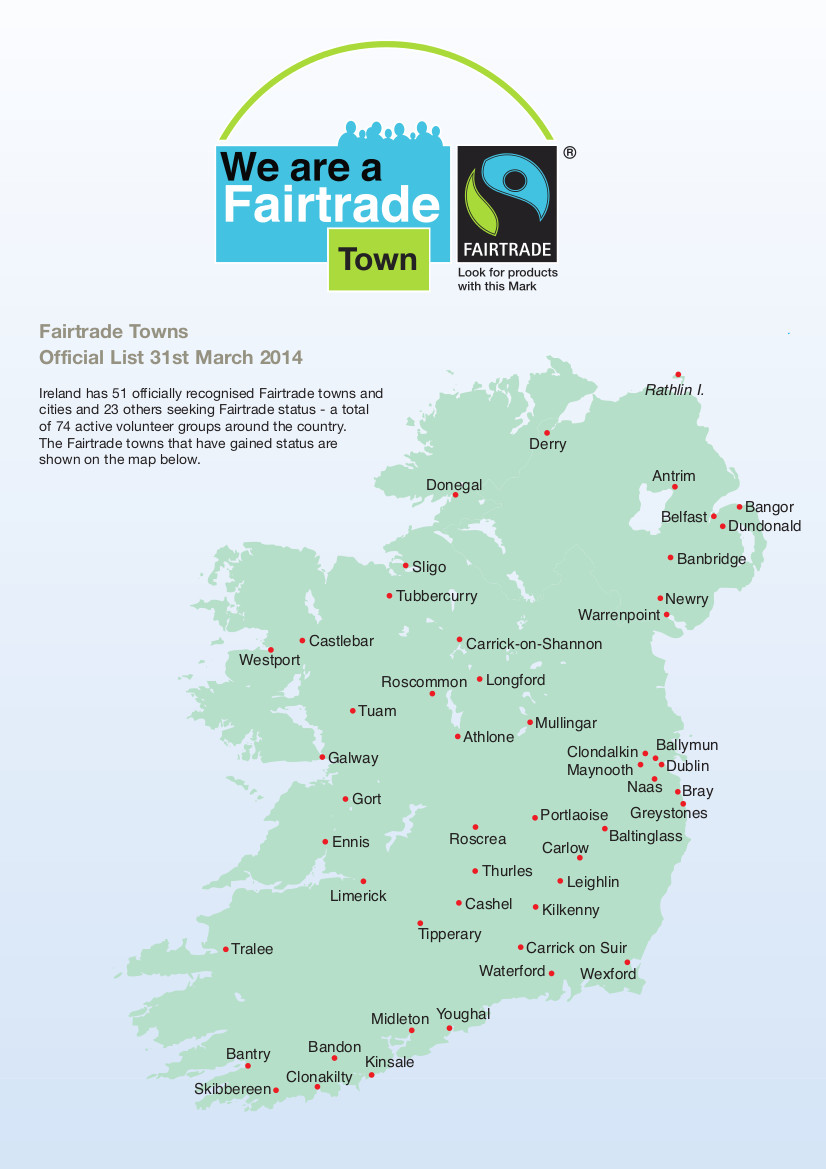 Ireland has 51 officially recognised Fairtrade towns and cities and 23 others seeking Fairtrade status – a total of 74 active volunteer groups around the country. Behind the Fairtrade schools, volunteers and Fairtrade town steering committees are thousands (yes thousands!) of trade justice activists.
Ireland has 51 officially recognised Fairtrade towns and cities and 23 others seeking Fairtrade status – a total of 74 active volunteer groups around the country. Behind the Fairtrade schools, volunteers and Fairtrade town steering committees are thousands (yes thousands!) of trade justice activists.
More info: www.fairtrade.ie/get-involved
2. Contrary to what might be expected during the recession, Fairtrade sales continued to grow in Ireland.
In the last five years retail sales of Fairtrade products paint a positive picture as sales have nearly doubled since 2009.
| Year | Estimated Retail Sales (in millions) | Growth rate |
| 2014 | €221m | +12% |
| 2013 | €197m | +13% |
| 2012 | €174m | +9% |
| 2011 | €159m | +15% |
| 2010 | €138m | +17% |
| 2009 | €118m |
Note: figures obtained from IFTN annual reports.
3. Ireland ranked 7th in the world for actual Fairtrade retail sales in 2013.
Fairtrade International calculates the total estimated retail sales value based on both ‘out of home sales’ and retail sales since this more accurately reflects what consumers spend on Fairtrade products. Out of home sales come from products consumed outside of the home; for example in cafés and restaurants. Retail sales come from consumer products bought in stores and supermarkets.
Out of the top 28 countries in the world listed by Fairtrade International for sales in 2012 Ireland ranked 7th.
| Rank | Country | Sales in millions (€) |
| 1 | UK | 2,045m |
| 2 | Germany | 654m |
| 3 | France | 354m |
| 4 | Switzerland | 353m |
| 5 | USA | 309m |
| 6 | Sweden | 232m |
| 7 | Ireland | 197m |
| 8 | Netherlands | 197m |
| 9 | Australia/NZ | 189m |
| 10 | Finland | 157m |
| 11 | Austria | 130m |
Source: Fairtrade International annual report 2012-13
4. In Ireland we consume about 5 million bananas every week. However, last year, it is estimated only one in 12 bananas consumed in Ireland was Fairtrade certified. Out of 5 million bananas sold weekly, then, only 416,000 are Fairtrade certified.
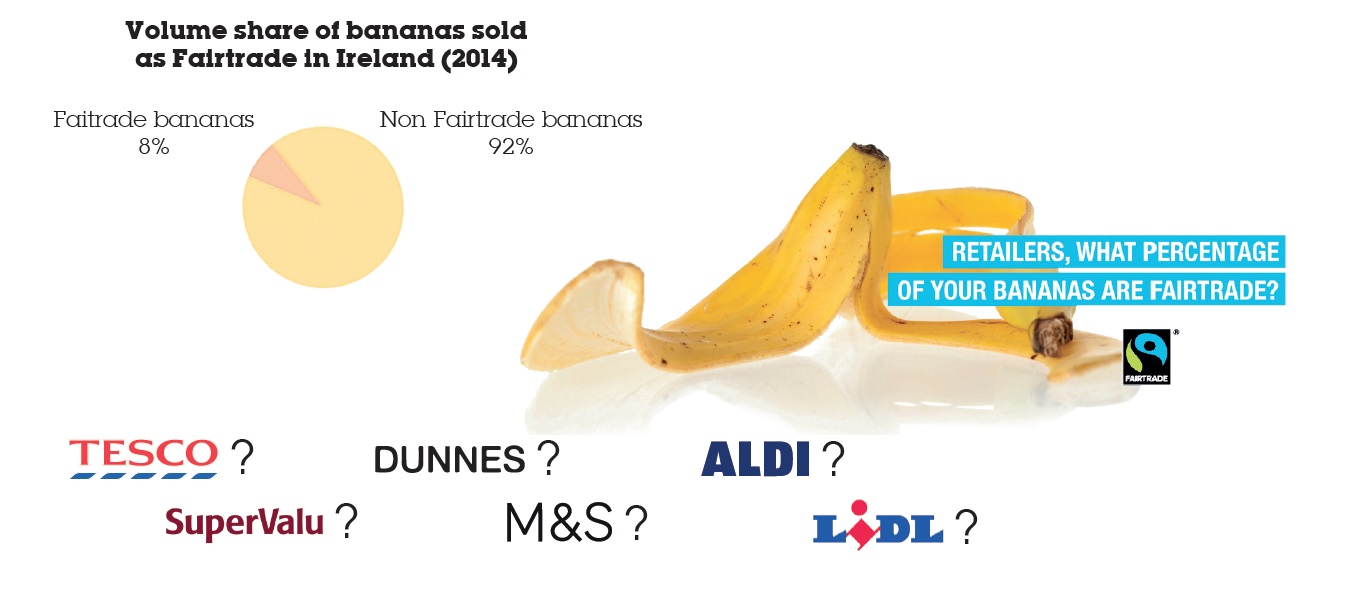
This year’s Fairtrade fortnight campaign focused on bananas. Fairtrade Ireland reports that almost 50% of Irish consumers eat bananas on a daily basis. But only 8% of bananas sold in Ireland were Fairtrade certified (by volume) compared to around 35% in the United Kingdom and 60% in Switzerland.
| Top 4 retailers that sell Fairtrade bananas in Ireland | |
| Marks and Spencer’s | 50% |
| Lidl | 20% (Lidl which represents 44% of all bananas sold in Ireland) |
| Aldi | 15% |
| Tesco | 14% |
These four retailers collectively account for about 41% of Irish grocery market share in 2014 but who are also responsible for the sale of 87% of Fairtrade bananas.
Source: Fairtrade Bananas: time for change report (February 2015) Fairtrade Ireland.
Note: the sale of Fairtrade bananas accounted for 5 per cent of our total spending on Fairtrade products in Ireland in 2014, compared to 60 per cent for coffee and 26 per cent for chocolate.
5. Per person, we spend more on Fairtrade goods than any other country on the planet.
On average, each person in Ireland spent €49 in 2014.
“We have come a long way in Ireland since the first two tonnes of Fairtrade coffee were imported by Bewley’s in 1996 –775 tonnes [of Fairtrade coffee] were sold in Ireland in 2013.”
– Peter Gaynor, Executive Director with Fairtrade Ireland (speaking in Aug 2014).
Before 1996 many non-governmental organisations brought Fairtrade goods into Ireland in small quantities for their members and in building local supplies through the work of solidarity groups such as Comhlámh’s Campaign Coffee Group.
6. Since 2012, at least half of all public procurement contracts in Ireland now incorporate green criteria.
This is a good news story.
In 2012, the Department of the Environment, Community and Local Government and the Department of Public Expenditure and Reform jointly published Green Tenders: An Action Plan on Green Public Procurement.
This national action plan aims to help public authorities to implement green public procurement (GPP) by highlighting existing best-practice and outlining further actions to increase green public procurement.
Three points in the GPP are worth highlighting that has implications for the Fairtrade movement:
“Ultimately, GPP is a policy tool for sustainable development and environmental issues are only one aspect of this. For this reason, several of the actions set out in this plan take account of emerging international trends whereby the sustainability of procurement policy is gauged in terms of social and economic as well as environmental impacts.” (Green Tenders, page 4)
“The sourcing of Fairtrade goods, where possible, should be part of all Government departments’ purchasing policy. Those public bodies that want to source Fairtrade and other similar products should ensure that the purchase of such products is in line with European Union legislation and guidelines.” (Green Tenders, page 41).
[With regard to uniforms and other textiles, the National Action Plan states that] “Public bodies involved in the procurement of textiles, garments and uniforms need to be particularly mindful of the social dimension of sustainable procurement.” (Green Tenders, page 52).
The public sector’s total purchasing power is approximately €15 billion per year.
In 2010 this sum consisted of €6 billion for capital works and €9 billion for goods and services. The Green Tenders action plan seeks, in the coming years, to leverage this purchasing power in favour of the provision of environmentally-friendly goods, services and works.
7. Along with its network of supporters and ethical consumption activists, Fairtrade Ireland isn’t afraid of the ‘uncomfortable business’ of building pressure to move us from small gestures to large ones.
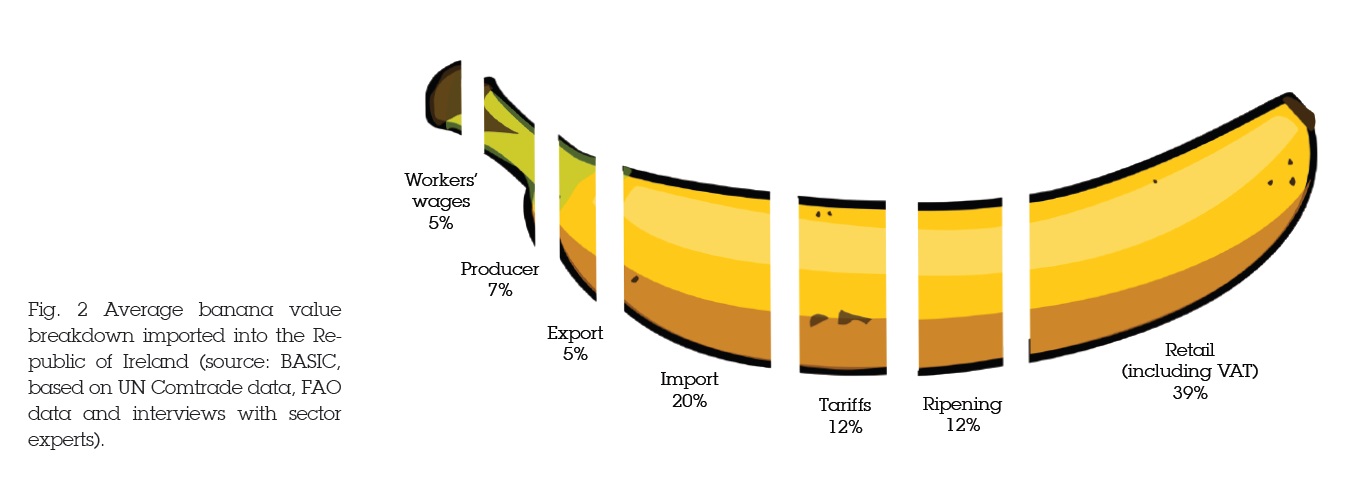
Promises of fair trade take-up are one thing. Delivery is entirely another. These days the majority of retailers have at least some Fairtrade products on their shelves. But is this just tokenism?
In a multibillion grocery market industry, piecemeal measures can sometimes hold back progress in Fairtrade as many retailers and multinational companies rush to the positive promotion that comes with being associated the Fairtrade movement but don’t deliver on the range of products or only on some.
By engaging in public education and research activities annually Fairtrade Ireland is building a movement of Fairtrade producers, suppliers and consumers.
On the responsibilities and spending power of Irish retailers: A report released in February by Fairtrade Ireland found that while Irish awareness of Fairtrade is very high (82%), just 7.7% of bananas sold in Ireland are Fairtrade. In the UK the corresponding figure is 30%, while in Switzerland 50% of bananas are Fairtrade certified.
Commenting on the findings, Executive Director of Fairtrade Ireland Peter Gaynor said,
“The companies with the greatest power to harness our spending power to help lift people out of poverty are the retailers – and in Ireland they seem either blissfully unaware or indifferent to both the opportunity and responsibility to do so.”
On strengthening a whole-government approach: In 2012 during the review of Ireland’s overseas aid programme the Irish Fairtrade Network made a submission calling on Irish Aid to strengthen and renew initiatives which support fair and ethical trade and went further by looking for Irish Aid to issue a strong statement:
“To counteract the negative impression created by the Department of Foreign Affairs and Trade Africa Strategy of 2011 which virtually ignored the question of trade into Ireland while focusing on Irish export promotion.”
8. Ireland’s contribution to agricultural improvement in developing countries and to a more equitable international trading regime by supporting partners on the ground, especially across Africa and Central America, has benefitted almost 150,000 families directly and large numbers indirectly.
Over the past 15 years and through the Irish overseas aid programme (Irish Aid), Ireland has become one the most important donors to the international fair and ethical trade movement, supporting capacity building for small coffee producers in Central America through its funding for Fairtrade Labelling Organisation International (FLO).
The programmes focus on producer support and farmer cooperatives have a particular focus on good agricultural and processing practises through:
- access to certification
- technical assistance
- training
- systems development
- credit management
The majority of funding from Ireland has targeted programmes to assist small-scale producers in Central America (El Salvador, Guatemala, Honduras, and Nicaragua) and in East Africa (Kenya, Uganda, Tanzania and Ethiopia). The IFTN reports that these programmes have benefitted almost 150,000 families directly and large numbers indirectly.
9. Ireland is a country of Fairtrade firsts.
The Dail became one of the first Fairtrade Parliaments in the world in 2008.
A year later, Senator Mark Daly of Fianna Fáil celebrated the introduction of Fairtrade products into Leinster House:
“I’m delighted that the introduction of Fairtrade products throughout the Oireachtas has been a complete success over the past year. It’s vital that we continue to use and promote Fair Trade products. It is part of the Government’s commitment in the Programme for Government to use Fair Trade products where possible and it will make a major impact in less fortunate parts of the world.”
The Stradbally-based Electric Picnic music festival became the world’s first Fairtrade Arts and Music Festival in 2012. As stated on their website:
“In Ireland we have a great record of supporting Fairtrade with about 80% of Irish people believing that companies have a responsibility to address issues of poverty in their supply chains. Electric Picnic is leading the way. As well as requesting the traders on site to serve Fairtrade Certified coffee, tea and cocoa, there will be plenty of opportunities to sample other Fairtrade products at the Picnic.
If Electric Picnic proves anything, it proves that it’s possible to enjoy yourself – and still make a difference to others.”
10. The sourcing, processing of goods and stocking of shelves in Ireland is underwritten by a growing movement of traders, businesses and wholesalers actively involved in ethical trading initiatives.
…. coffee, tea, sugar, bananas, chocolate, cocoa, confectionery, cosmetics, biscuits, fresh and dried fruit, ice cream, nuts, spices, fruit juice, honey, jams, rice, wine, oils, cotton and footballs…
Still think that the Fairtrade movement is only about coffee and bananas?
Now more than 15 years in the making, the ‘business case’ for adopting Fairtrade products is no secret. Trading in products that have been ethically sourced has become a popular selling point for many retailers and outlets.
The scale of support from businesses in Ireland for Fairtrade products has never been greater. While there are many challenges about whether grocery suppliers have gone far enough its worth stepping back and acknowledging how far we’ve come.
Here’s a cursory glance at just some of the business in Fairtrade in Ireland:
- Insomnia coffee was started selling 100% Fairtrade coffee in 2006 (and hot chocolates since then). Insomnia has 80 outlets across Ireland and sells over 6 million cups of coffee annually.
- Centra full roast coffee (100% Fairtrade via Bewleys). Centra sells over 8 million cups of coffee a year.
- The Happy Pear Organic Store and Restaurant and The Fresh Market (which has five stores in Ireland) have both announced a commitment to stock 100% fairtrade and bananas.
- Insomnia partnership with Spar operates 40 Insomnia barista sites within its estate. There are also 175 self-service units.
- Ben and Jerry Ireland (ice-cream business) is shifting its entire overseas product
- During Fairtrade Fortnight 2015 Mars made the commitment to source 100% Fairtrade cocoa for their Mars bars.
- Nestlé Ireland are on target to sourcing 100% of their cocoa from sustainable sources by 2015, having worked in partnership with the Fairtrade Foundation.
Sources: Sunday Indo Business report (23 Feb 2015); Musgrave Group (24 Nov 2011); Checkout Magazine (25 Feb 2015); Business etc, The Journal (1 Aug 2014); Insomnia website (16 March 2015)
On a final note…
Products with the Fairtrade Mark are now widely available in shops, restaurants and cafés throughout Ireland and in all the main supermarkets, including Centra, Dunnes Stores, Lidl, Marks & Spencer, Spar, Superquinn, SuperValu and Tesco.
However Fairtrade still only represents a fraction of imported tropical commodities (currently only 8% of bananas in Ireland sold in Ireland are Fairtrade certified).
For more information on how businesses can put the Fairtrade mark on their products (sourcing ingredients, sell wholesale, stock goods or serve within the workplace) visit www.fairtrade.ie/business.
More on developmenteducation.ie
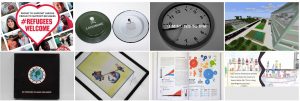
From Nicaragua to Ireland: Fairtrade Coffee and Global Solidarity
Fátima Ismael of Soppexcca, Cathal Murphy from Bewley’s and Fairtrade practitioner Kieran Durnien discuss 20 years of Fairtrade coffee solidarity linking Nicaragua and Ireland.
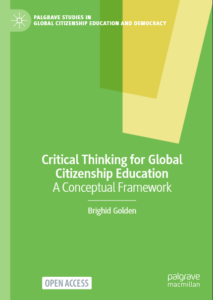
Critical Thinking for Global Citizenship Education
Join Brighid Golden for the launch of her latest book, ‘Critical Thinking for Global Citizenship Education: A Conceptual Framework’
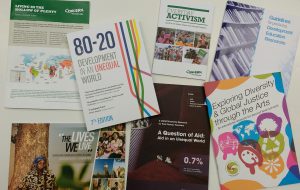
Your voice matters – 2026 user survey open
It’s January, its 2026, and we want to hear what you’d like us to feature or work on in 2026.
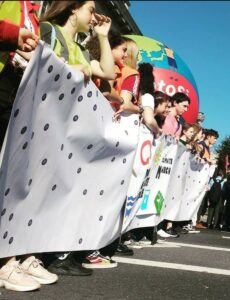
Calling Post Primary Teachers – Survey Participation Request
Your voice is vital in shaping the future of education for sustainable development in Ireland. Join a national survey for post primary teachers in October, led by DCU researcher Valerie Lewis

Webinar: Science for development on World Food Day
The webinar will feature YSTE projects, from Santa Sabina Dominican College (Dublin), Moate Community School (Westmeath) and CBS Thurles that focussed on nutrition and better food production, with Self Help Africa’s nutrition and gender specialist in Ethiopia, Sara Demissew.
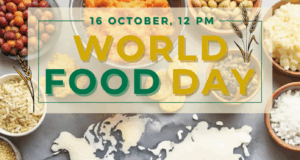
Student & teacher webinar: Food, hunger and SDG 2
Join the World Food Day webinar for post primary school students and teachers which will explore SDG 2: Zero Hunger.

